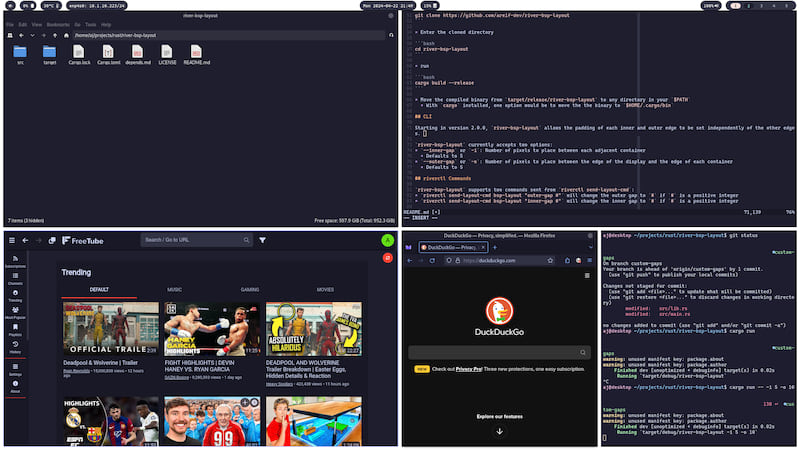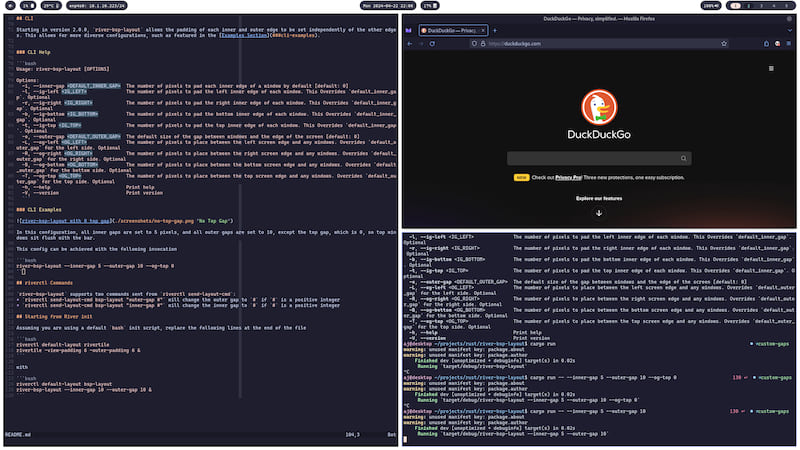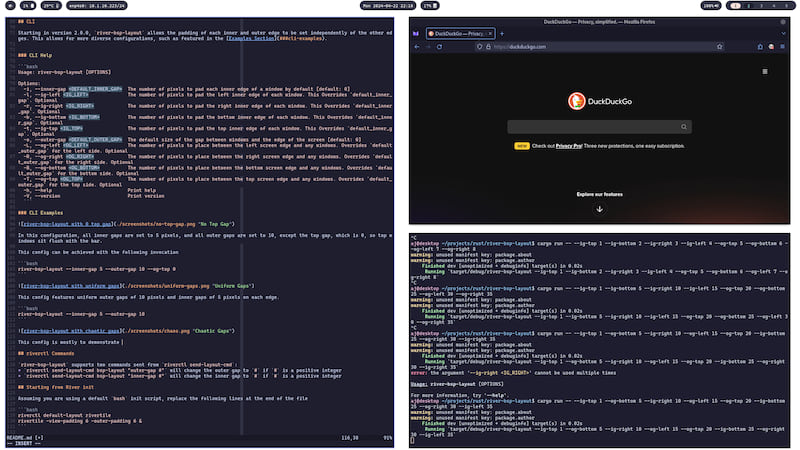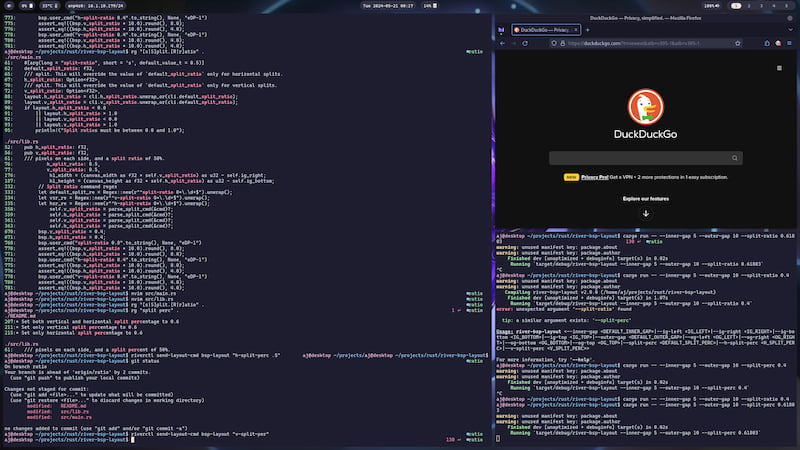6 stable releases
| 2.1.1 | Jan 28, 2025 |
|---|---|
| 2.1.0 | Aug 15, 2024 |
| 2.0.0 | Apr 23, 2024 |
| 1.1.2 | Feb 17, 2024 |
| 1.1.1 | Aug 29, 2023 |
#220 in GUI
3MB
506 lines
river-bsp-layout

Custom River layout manager that creates a Binary Space Partition / Grid layout using river-layout-toolkit
3 Window Example:
+----------------+----------------+
| | |
| | |
| +----------------+
| | |
| | |
+----------------+----------------+
4 Window Example:
+----------------+----------------+
| | |
| | |
+----------------+----------------+
| | |
| | |
+----------------+----------------+
Installing
Fedora
dnf copr enable areif-dev/river-bsp-layout
dnf install river-bsp-layout
NixOS
# configuration.nix
environment.systemPackages = with pkgs; [
# Other packages ...
river-bsp-layout
];
Other - Cargo
cargo install river-bsp-layout --locked
Building
- Make sure you have
cargoinstalled. The recommended means of installation is withrustup.shfrom https://www.rust-lang.org/tools/install - Clone this repo with
git clone https://github.com/areif-dev/river-bsp-layout
- Enter the cloned directory
cd river-bsp-layout
- run
cargo build --release
- Move the compiled binary from
target/release/river-bsp-layoutto any directory in your$PATH- With
cargoinstalled, one option would be to move the the binary to$HOME/.cargo/bin
- With
Starting from River init
Assuming you are using a default bash init script, replace the following lines at the end of the file
riverctl default-layout rivertile
rivertile -view-padding 6 -outer-padding 6 &
with
riverctl default-layout bsp-layout
river-bsp-layout --inner-gap 5 --outer-gap 10 --split-perc 0.5 &
CLI Help
Usage: river-bsp-layout [OPTIONS]
Options:
-h, --help Print help
-V, --version Print version
Inner Gap Options:
-i, --inner-gap <DEFAULT_INNER_GAP> The number of pixels to pad each inner edge of a window by default [default: 0]
-l, --ig-left <IG_LEFT> The number of pixels to pad the left inner edge of each window. This Overrides `default_inner_gap`. Optional
-r, --ig-right <IG_RIGHT> The number of pixels to pad the right inner edge of each window. This Overrides `default_inner_gap`. Optional
-b, --ig-bottom <IG_BOTTOM> The number of pixels to pad the bottom inner edge of each window. This Overrides `default_inner_gap`. Optional
-t, --ig-top <IG_TOP> The number of pixels to pad the top inner edge of each window. This Overrides `default_inner_gap`. Optional
Outer Gap Options:
-o, --outer-gap <DEFAULT_OUTER_GAP> The default size of the gap between windows and the edge of the screen [default: 0]
-L, --og-left <OG_LEFT> The number of pixels to place between the left screen edge and any windows. Overrides `default_outer_gap` for the left side. Optional
-R, --og-right <OG_RIGHT> The number of pixels to place between the right screen edge and any windows. Overrides `default_outer_gap` for the right side. Optional
-B, --og-bottom <OG_BOTTOM> The number of pixels to place between the bottom screen edge and any windows. Overrides `default_outer_gap` for the bottom side. Optional
-T, --og-top <OG_TOP> The number of pixels to place between the top screen edge and any windows. Overrides `default_outer_gap` for the top side. Optional
Split Options:
-s, --split-perc <DEFAULT_SPLIT_PERC> The default percentage of available area that the primary window should occupy after any split takes place [default: 0.5]
-H, --hsplit-perc <HSPLIT_PERC> The percentage of available area that the primary window should occupy after a horizontal split. This will override the value of `default_split_perc` only for
horizontal splits
-v, --vsplit-perc <VSPLIT_PERC> The percentage of available area that the primary window should occupy after a vertical split. This will override the value of `default_split_perc` only for vertical
splits
--start-hsplit Whether the first split that's made should divide the screen horizontally. If this is not set, then the first split will be vertical
Other Options:
--reverse Reverse the order of the views as well as the order they are added
CLI Examples

In this configuration, all inner gaps are set to 5 pixels, and all outer gaps are set to 10, except the top gap, which is 0, so top windows sit flush with the bar.
This config can be achieved with the following invocation
river-bsp-layout --inner-gap 5 --outer-gap 10 --og-top 0

This config features uniform outer gaps of 10 pixels and inner gaps of 5 pixels on each edge.
river-bsp-layout --inner-gap 5 --outer-gap 10

This config is mostly to demonstrate the possibilities of individually configurable edge gaps.
river-bsp-layout --ig-top 1 --og-bottom 5 --ig-right 10 --og-left 15 --og-top 20 --ig-bottom 25 --og-right 30 --ig-left 35

This run demonstrates the ability to split the screen into unequal chunks whenever a split takes place. This allows for greater focus to be put on your primary window(s)
river-bsp-layout --inner-gap 5 --outer-gap 10 --split-perc 0.61803
Riverctl User Commands
For the most part, you can pass the same options to riverctl send-layout-cmd that you would send to bsp-layout when starting it initially. However, some additional riverctl options exist, such as --start-vsplit, which will set a vertical split as the primary split.
Addtionally, there are the options --(inc|dec)-(h|v)split, which will allow you to add or subtract a given amount from the current split percentage. This command can be useful to temporarily draw more focus to a particular window, and is very handy when bound to a keybind.
Finally, the --reverse option -- while not new -- does behave slightly differently to the cli option of the same name. The cli behavior is to cause new views to be rendered to the right and bottom side of the screen, whereas the user cmd option will flip the stack to the opposite of what the existing state is everytime it's called.
Unlike in previous versions of bsp-layout where only one command could be parsed at a time, versions 2.1.0 and forward are able to parse almost any combination of options passed at once. The only exception to this being --start-vsplit and --start-hsplit, which are mutually exclusive with each other.
Usage: riverctl send-layout-cmd bsp-layout [OPTIONS]
Inner Gap Options:
-i, --inner-gap <DEFAULT_INNER_GAP>
The number of pixels to pad each inner edge of a window by default
-l, --ig-left <IG_LEFT>
The number of pixels to pad the left inner edge of each window. This Overrides `default_inner_gap`. Optional
-r, --ig-right <IG_RIGHT>
The number of pixels to pad the right inner edge of each window. This Overrides `default_inner_gap`. Optional
-b, --ig-bottom <IG_BOTTOM>
The number of pixels to pad the bottom inner edge of each window. This Overrides `default_inner_gap`. Optional
-t, --ig-top <IG_TOP>
The number of pixels to pad the top inner edge of each window. This Overrides `default_inner_gap`. Optional
Outer Gap Options:
-o, --outer-gap <DEFAULT_OUTER_GAP>
The default size of the gap between windows and the edge of the screen
-L, --og-left <OG_LEFT>
The number of pixels to place between the left screen edge and any windows. Overrides `default_outer_gap` for the left side. Optional
-R, --og-right <OG_RIGHT>
The number of pixels to place between the right screen edge and any windows. Overrides `default_outer_gap` for the right side. Optional
-B, --og-bottom <OG_BOTTOM>
The number of pixels to place between the bottom screen edge and any windows. Overrides `default_outer_gap` for the bottom side. Optional
-T, --og-top <OG_TOP>
The number of pixels to place between the top screen edge and any windows. Overrides `default_outer_gap` for the top side. Optional
Split Options:
-s, --split-perc <DEFAULT_SPLIT_PERC>
The default percentage of available area that the primary window should occupy after any split takes place
-H, --hsplit-perc <HSPLIT_PERC>
The percentage of available area that the primary window should occupy after a horizontal split. This will override the value of `default_split_perc` only for horizontal splits
-v, --vsplit-perc <VSPLIT_PERC>
The percentage of available area that the primary window should occupy after a vertical split. This will override the value of `default_split_perc` only for vertical splits
--start-hsplit
Set the first split to horizontal. Mutually exclusive with `--start-vsplit`
--start-vsplit
Set the first split to vertical. Mutually exclusive with `--start-hsplit`
--inc-hsplit <INC_HSPLIT>
Increase the hsplit percentage by a certain amount
--inc-vsplit <INC_VSPLIT>
Increase the vsplit percentage by a certain amount
--dec-vsplit <DEC_VSPLIT>
Decrease the vsplit percentage by a certain amount
--dec-hsplit <DEC_HSPLIT>
Decrease the hsplit percentage by a certain amount
Other Options:
--reverse
Reverse the order of the views as well as the order they are added
User Commands Examples
- Flip the orientation of the stack and set all inner gaps to be 5 pixels wide
riverctl send-layout-cmd bsp-layout "--reverse -i 5"
- Map a keybind to increase the vertical split percentage by a small amount
riverctl map normal $MOD+Shift L send-layout-cmd bsp-layout "--inc-vsplit .005"
- Set the first split of the stack to be horizontal
riverctl send-layout-cmd bsp-layout "--start-hsplit"
Dependencies
~4–14MB
~182K SLoC